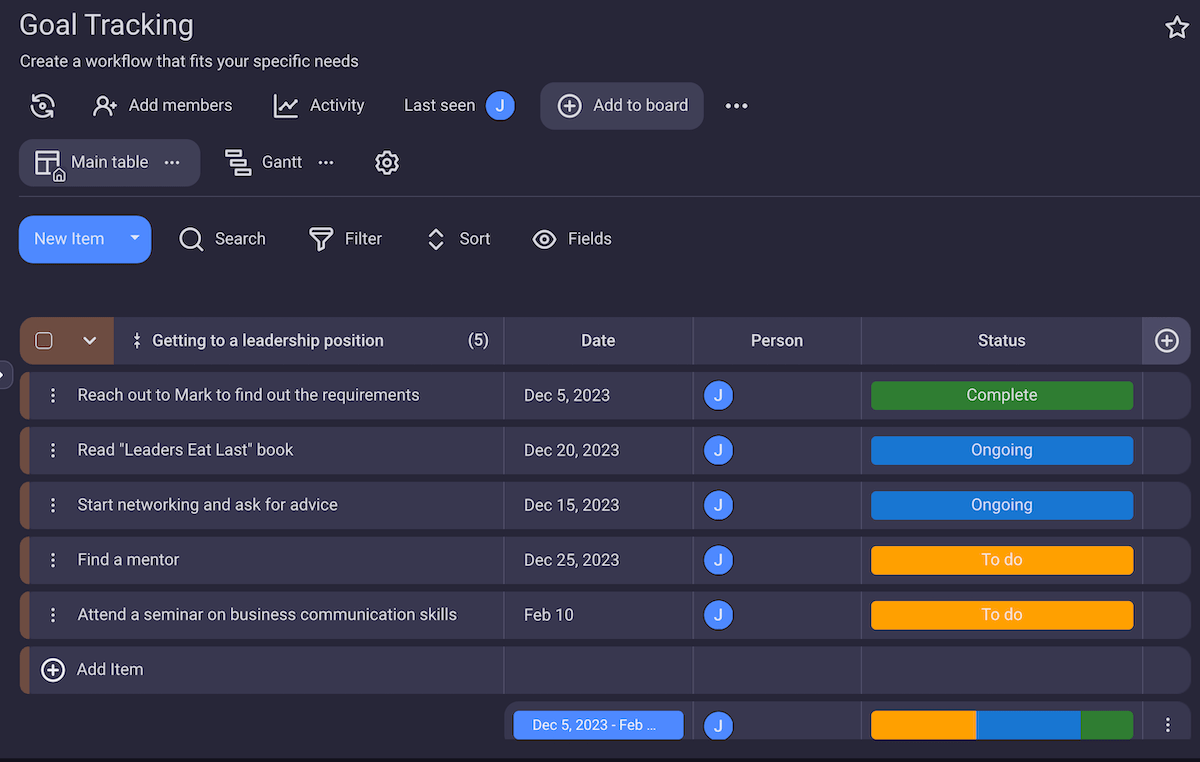We all make plans for the future, don’t we?
No matter if those plans apply to our personal or professional lives, they are there to guide us from where we are to what we want to become or where we want to be in the future.
Anyone who wants to climb the career ladder knows that professional development and smart career planning are crucial for career success.
An integral part of a career plan are short-term goals, and they are exactly what we’ll focus on in this article. We’ll look at what they are, why they are important for your career, and how they can help you succeed.
As a cherry on top, we’ll also provide tips on how to set and track short-term career goals.
Let’s dive in!

- There are 4 types of short-term goals for work: career, health and fitness, financial, and educational.
- A short-term career goal can be either independent or a part of a long-term goal.
- Examples of short-term goals vary from tidying up your office desk to upgrading communication skills.
- Short-term career goals help you accomplish long-term goals and climb the career ladder.
- There are several tips on how to set short-term career goals such as using SMART goals, creating a detailed plan, and ditching the “Shoulds”.
Types of short-term career goals
Short-term career goals are professional objectives set to be accomplished in the near future.
As their name suggests, these goals are meant to be met within a very short period of time — a few days, weeks, or months.
Overall, short-term career goals can aid you in the completion of long-term goals. You can think of them as stairs that will get you to the next level — in which case, the next level is a long-term goal such as a promotion or becoming a partner in a law firm.
Different people set different short-term goals for work and career advancement. These goals are usually divided into 4 groups:
- Career short-term goals,
- Health and fitness short-term goals,
- Financial short-term goals, and
- Educational short-term goals.
Let’s discuss each of these.
Type #1: Career short-term goals
These short-term goals relate to the way you work and include all those changes and adjustments you can make to upgrade your skills and knowledge.
Whether you only make a small change in your working routine or you undergo job-related training — it all counts toward your professional advancement.
Career short-term goals are set mostly because you want to be more productive, enhance your soft and/or hard skills, or be more organized.
Your colleagues will certainly notice your well-organized working space, better presentation skills, or your newly established technical expertise.
💡 Plaky Pro Tip
If you want to learn why organizing work is important and pick up some useful tips, check out the following article:
Type #2: Health and fitness short-term goals
Health and fitness short-term goals are as important for your work as they are for personal wellbeing. These goals imply taking care of your health, regular physical activity, and enough sleeping.
Whether your work model is traditional office-bound, remote, or hybrid, you’ll agree that maintaining good work-life balance is quite a challenge.
We often forget our meals, and if we take a lunch break, we opt for fast food in most cases. Also, long hours at work, sleep deprivation due to stress at work, and lack of regular physical activity are very common.
However, all of this directly impacts our work performance — whether we like it or not.
Staying healthy and including some exercise in our daily routine should be an imperative. In addition, taking care of our well-being by setting clear boundaries to how much time we spend at work needs to become a top priority.
Only if we pay more attention to our welfare can we become more energetic and productive at work.
Type #3: Financial short-term goals
Setting financial short-term goals is all about having greater control over your savings and expenditures.
Since we all work for money, the financial aspect is one of the most important points when deciding whether to accept a job. Also, financial benefits are usually the reason why people want to be promoted.
Work-related short-term financial goals usually refer to earning a bonus or starting a side hustle.
On the other hand, your short-term financial goals are more related to your own budget plans. For example, you can set a goal to reduce your credit card debt or put aside a certain amount of money towards a savings account.
All in all, establishing short-term goals for your finances will help you gain better control over the money you spend. As a result, it can have a great impact on how you’ll manage project budgets at work in the long run.
Type #4: Educational short-term goals
Knowledge upgrades are often key for professional development. If you’re considering getting promoted or shifting your career, additional training and studying will drive new opportunities.
By setting educational short-term goals, you invest in both your personal and professional growth. With every goal achieved, you build on your industry expertise and get closer to your long-term career prospects.
Educational short-term goals might be taking work-relevant courses, attending seminars and workshops, and going to conferences.

20 examples of short-term career goals
It’s time to provide some concrete examples of short-term career goals. Below, you’ll find listed some of the most representative work-related goals.
Example #1: Obtain a professional certificate
Taking a professional development course, learning new technology, or getting a new certification will undoubtedly give you a professional advantage over others.
Knowledge is power, and to avoid being out of the loop, you need to build on your expertise and make sure it’s up to date.
Whether you are in medicine, education, project management, or any other field, you have to be aware that things change over the years, and you need to keep up if you want to keep the job or strive for some higher-paid position.
Example #2: Expand your industry-related knowledge
Attending seminars and workshops can give you the latest insights into what’s going on in your industry and generate some new ideas you can suggest at your next team meeting.
It is expected to be well-informed on industry trends, issues, and events. This is something that your employers will value and that can enhance your career prospects.
Also, you can subscribe to blog feeds and newsletters and follow relevant hashtags on social media. In addition, reading industry-related books and articles can improve your competitive edge.
Knowing current industry tendencies will open new opportunities and make you feel more confident and knowledgeable about your field.
Example #3: Improve your performance metrics
Performance metrics show how efficient you are at work. The number of sales you make, articles you write, or contracts you sign with clients are important since they tell you and your superiors whether you need to improve.
It’s good to talk with your superiors about what is expected and what performance numbers should be achieved. This way, you’ll know what to do and change in the future.
Make it a goal to have the highest number of sales or deliver projects in due time and work towards that goal. Improving your performance metrics will secure a successful performance review conversation with your managers.
💡 Plaky Pro Tip
Those metrics won’t improve themselves — you need to roll up your sleeves and get to work. If you need a little something to inspire and motivate you, try these quotes about hard work:
Example #4: Build up your professional network
You can often hear it’s all about who you know. And, networking is the best way to get to know people.
According to Forbes, 85% of jobs positions are filled thanks to personal and professional connections, i.e. networking.
Finding the right connections might be crucial for your professional development. You never know who you can meet.
For example, you can start networking by connecting with colleagues outside your team. To grow your professional network even more, apply for participation at conferences or events your company attends. These will be chock-full of useful connections that can be open for cooperation and career development.
Another option is digital networking. Find relevant professionals through LinkedIn or other social media and follow what they do, make comments, and ask questions as all of it can guide you in your professional ambitions.
Example #5: Find an experienced mentor
Your networking opportunities might be a great way to find a mentor who has already been in your shoes and is now successful in the industry.
An experienced mentor can show you the ropes and share tactical tips on possible career advancement.
Think about what you can ask this person and be willing to accept both criticism and appraisal of your current work performance.
Example #6: Improve your communication skills
If you want to improve your communication skills, make sure you learn how to give and share feedback, use facial expressions and body language, and choose the right communication method depending on your audience.
Good communication skills are essential in any profession. But, being a good communicator is easier said than done.
Communication is not only about speaking. It involves active listening, showing respect toward your interlocutors, and even choosing the right volume and tone.
Example #7: Sharpen your time-management skills
How you manage your time at work is fundamental for your performance metrics.
If you waste your time browsing the Internet or chatting with colleagues, family, or friends instead of focusing on work, you should make changes before your work results are evaluated.
Poor time-management affects your productivity. If your skills are lacking in this area, you should find ways to improve them.
There are many ways to improve your time-management skills once you know what the problem is and what distractors you should do away with.
Example #8: Organize your workspace
Your workspace is often seen as a reflection of your performance.
If your colleagues and higher-ups see your desk full of scattered papers, notes, and office material, they won’t get the impression you are a highly organized person.
A disorganized workspace usually implies you spend a lot of time searching for what you need.
A cluttered work environment will not only have a negative impact on your productivity but also your state of mind and morale.
So, plan a daily or weekly tidying up of your desk, add some plants, and maybe even print out your favorite business quotes to motivate you and everyone in the office.
Keep in mind you should organize your virtual office space as well and archive your documents, reports, and emails in a smart way.
Example #9: Start a new project
Check with your managers if there are any internal projects you can work on. You can make a plan, form a team, and delegate tasks. Working on an internal project might be an exciting challenge to respond to and a great opportunity to see if you are well-versed in a new role.
Also, you can start a project on something you are really passionate about such as organizing a fundraising event within your company or giving a presentation on email marketing.
Whatever your choice might be, it should be a fulfilling experience for you which will incite you to move forward in your career path.
Example #10: Get promoted at work
Possibilities for promotion depend on the industry you work in and the company you work for. Many factors can influence whether it takes more or less time to advance and get to the desired position.
Nevertheless, if your goal is to earn a promotion, don’t shy away from talking to your higher ups on what is expected of you to get to a higher position.
Once you know the requirements, make a plan on how to meet them in the near future.
💡 Plaky Pro Tip
The best way to keep track of your progress is to self-evaluate. You can find a self-evaluation performance review template in the link below — use it as is or adjust it to your personal needs:
Example #11: Get a new job
If you feel demoralized at work due to a lack of overdue promotions, bad working conditions, or inadequate respect from your managers — it might be the time to say goodby and get a new job.
A job change can give you new opportunities and serve as a turning point in your career. When you get a new job, you’ll meet new people and keep being motivated to give your best and improve.
In case you opt for getting a new job, make sure the new role aligns with your career goals.
Example #12: Make your expertise known
There are many ways to showcase your professional experience and expertise.
One of the options you can start with is to update your resume. Having your resume ready and filled with data on your professional background will ease your application process for that dream job you want.
Next, if you want to be seen and recognized among industry experts, consider creating or updating your LinkedIn profile. This way, you’ll get noticed by relevant companies and potential employers.
Another way to present yourself is to design a website where you can describe your skills and work experience. You can include a portfolio of your projects, so anyone can see the quality of your work.
Example #13: Work on your workplace etiquette
If you constantly forget to put your smartphone on silent, make jokes at your coworkers’ expense, arrive late for meetings, or dress inappropriately, you can be sure you are breaching workplace etiquette.
While at work, you should show respect toward your colleagues and superiors and be heedful of other people’s feelings. Try not to make a big noise while you’re on call and pay attention to your body language.
Also, inform people about when you are available or off work, learn to accept different opinions, and give praise to your colleagues.
Most importantly, be on time for meetings, bring positive energy to work, and treat everyone fairly.
Example #14: Learn a new skill
Learning a new skill that can help you at work is always a plus. Observe what skills your coworkers or managers have and consider those you would like to learn.
With every new skill learned you become a more valued employee — especially if you are ready to step in when needed.
💡 Plaky Pro Tip
In case you pursue a career in project management, check out what specific skills are required to become a project manager:
Example #15: Volunteer for work
Volunteering for work is a great opportunity to broaden your knowledge. By choosing to take part in projects without compensation you show your aim is to learn and grow.
Also, volunteering enables you to show you’re a team player and you care for your company’s activities and projects.
Example #16: Learn from your coworkers
Learning from coworkers and asking them for advice can have a great impact on your productivity and work performance.
Don’t be afraid to observe your coworkers, learn their tricks, and endorse their qualities. Interact with them while at lunch break or team building activities and try to figure out if you can adopt their attitude and skills.
Example #17: Recognize your weaknesses
No one is perfect, but this is no excuse not to improve on our weaknesses, especially if they prevent us from career advancement.
Devote some time to think about whether you have any weaknesses that have a bad influence on your work performance.
Those weaknesses might be poor communication, arriving late, or being afraid of suggesting new ideas.
Once you know what the problem is, work on it and convert the weakness into your strength.
Example #18: Set the necessary boundaries
Setting boundaries can be difficult for some people because they might think saying no to more work load equals being considered a lackadaisical worker.
The truth is that boundaries are totally acceptable and setting them will earn you respect. You can always set simple boundaries such as allowing yourself some focus time during working hours or block calls while you are on a break.
Learn to say “no” to more work when you are snowed under. You are not a robot who can work 24/7.
Example #19: Find an optimal work-life balance
Finding an optimal work-life balance is an imperative in the contemporary world. Life is not all about work and you shouldn’t let work dominate your life.
With that in mind, one of your short-term goals should be to optimize your time well. Dedicate time to work, but also to your family, friends, and hobbies.
Keeping a healthy work-life balance will not only prevent burnout and resentment about going to work but also help you maintain good health and mental wellbeing.
Example #20: Find tools that can enhance your work performance
Being familiar with emerging technologies is, no doubt, a significant advantage to your professional career.
To improve your technical know-how, take time to do some research on the tools you can use to organize your tasks and time effectively.
These tools can help you maximize your productivity in the workplace and show your interest in improving work practices.

Why are short-term career goals important?
Short-term career goals represent milestones in your career life that show how far you are from reaching your main goals.
Short-term goals are important for your career success as they:
- Help you reach your ultimate goals bit by bit — small tasks are usually easily achievable and this gives you a sense of getting closer to your career aspirations,
- Keep you motivated and focused on the present target — since you deal with smaller, more immediate tasks, you are constantly motivated because you can see your efforts paying off,
- Provide better control of your current and future actions — short-term career goals are easily accomplished and measured,
- Encourage you to stay organized and make plans — with each goal reached, you make a plan for a new one and organize your time accordingly,
- Steer you in the right direction — your short-term goals are aligned with your career aspirations and by reaching them you get closer to your career goals,
- Foster new skill acquisition — short-term career goals promote the acquisition of relevant new skills if you are into career progression, such as an aspiring manager learning some leadership skills,
- Secure accountability — you are the only person in charge of your professional development, and, if you want to succeed, you need to stick to the plan and measure your goals on a regular basis,
- Reduce procrastination — short-term goals are expected to be achieved in a narrow time frame, thus preventing you from postponing tasks, and
- Show you have career plans to potential employers — employers will appreciate the fact that you have an idea about what you want to accomplish and a strategy for how to reach bigger career goals.
How can short-term career goals lead towards accomplishing long-term career goals?
One thing is sure — both short and long-term career goals help your professional advancement. The main difference is that long-term goals require more time to accomplish. When we talk about the time it takes to achieve long-term goals, we have a period of 5-10 years in mind.
On the other hand, short-term goals are understood as steps towards achieving long-term goals, as they operate on a shorter time frame. Another advantage of short-term goals is that you can deal with more than one goal at a time whereas long-term goals require stronger focus. What’s more, short-term goals are easily measured.
Although short-term goals might be independent, such as taking time to tidy up your office desk, they are, in most cases, a part of a wider strategy to achieve long-term success.
How short-term goals lead to achieving a long-term goal — an example
Say your long-term goal is to get a leadership position. Depending on your company rules and procedures this goal might require several steps. Accordingly, your short-term career goals list might include:
- Reaching out to your superiors to find out what the requirement are to get to a leadership position,
- Networking with people in leadership positions who can give you tips on what is best to do,
- Finding a mentor,
- Working on leadership skills such as communication, decision-making, and delegation,
- Asking to work on projects that can provide insights into how other teams work,
- Assisting in management meetings to learn the tricks of the trade,
- Interacting with clients,
- Asking for feedback,
- Proposing ideas and solutions,
- Supporting your team.
Tips on how to set short-term career goals
Your career roadmap should be carefully structured so your short-term career goals work in the furtherance of your own career.
You can use the following tips to help you specify your short-term career goals:
Tip #1: Create a detailed plan
Creating a detailed plan takes some time. You need to brainstorm what you want to achieve, what resources you might need, and how you are going to organize your time.
If it makes sense for you, set deadlines and share your plan with your family or coworkers to make sure you are on the right track and that you have set a good timeline.
We reached out to Emily Warden, a certified professional career coach, for advice, and she proposed starting with a long-term goal and working your way backwards:

“First, determine your long-term goals – where would you like to be 1 year, 3 years, or 5 years from now? Then work backward from there.
For example, if you would like to be promoted one year from now, break down the steps about how to get there (meet with your boss, set performance metrics, sign up for a big project, etc…).
Look one year into the future, then break down that year into quarters. Then set three-month goals for each quarter. This will keep you focused on the short-term goals that lead to long-term payoffs.”
Tip #2: Make your goals visible
It is important to remind yourself about your short-term goals and the actions required to achieve them.
No matter whether you write these down on a digital sticky note on your desktop or you have a memo book and tick off the goals achieved, it is all good as long as you make them visible.
Tip #3: Make sure your goals are inspiring
As long as the goals you set inspire you to go further and keep you motivated, you are on the right track.
Your goals should be aligned with your career vision and the image you have about your future career. Think carefully if your career goals are worth your time and effort. If you are sure of what you want, the sense of accomplishment will prevail each time you reach a short-term goal.
Tip #4: Enhance your accountability
Make sure you follow your career map carefully and follow the path towards success. Try not to procrastinate and — what’s worse — neglect your short-term goals.
Follow your own progress and if it happens to stumble down, try to readjust the initial plan and to suit your current situation.
Tip #5: Set SMART goals
Setting SMART goals implies your short-term goals should be specific, measurable, achievable, relevant and time-bound.
Try to set goals that satisfy all these criteria. You can search for different apps and templates online as these can help you stay organized and focused.

Tip #6: Ditch the “Shoulds”
This great tip was brought to us by Tim Toterhi, PPC, PMP, CHRO and career coach, who advocates for abandoning all unnecessary goals and concentrating on what really matters:

“If you want to level-up your short-term career goals, ditch the “Shoulds”.
Instead of robotically setting SMART goals for a laundry list of should dos, make room for success by evaluating your current commitments and ditching what doesn’t belong.”
You can add as many dos as you want to your list, but Toterhi calls into question if that is what we really need:

“Sure, maybe reading up on AI and machine learning is a good use of time. And maybe you should finally master pivot tables, dive deep into SEO, and enhance your executive presence. Just don’t forget about that networking course you’ve been putting off, and the podcasting seminar…”
Toterhi highlights learning takes time and concludes by saying how you should drop old short-term goals that no longer lead you towards the finish line:

“Short-term goals are tempting because they appear as easily completed, tick-box items. But learning takes time and consistency. You simply can’t win a race by running in multiple directions. If you want to run farther, faster, you have to ditch what’s weighing you down. That means letting go of old goals and pursuing the few that truly matter.”
How to track short-term career goals?
We have covered tips on how to set short-term career goals, but it is equally important to know how to track them.
There are several ways you can track your goals:
- Find a visible place to hang a calendar and write down the goals for a particular day, week, or month. You can also circle your deadline dates to make sure you don’t delay anything.
- Use task management software to set your goals and due dates, to plan activities and projects related to your goals. This way you can have all your goals in one place.
- Pin your tasks on your digital calendar and write reminder emails and/or text messages.
- Use bulleted journals to write down short reminders on what needs to be done.
- Draw up a checklist or find one online where you will tick off what has been done.
If you decide to use task management software for goal tracking, you can easily list all your goals and set status and deadlines for each. You can save files and documents that are important for your tasks. This way you keep everything organized and in one place.

Track your short-term career goals with Plaky
Short-term career goals make a great part of our professional life as they help us work our way towards what we want to become one day.
Using task management software like Plaky will help keep all your goals in one place and track your progress toward them with ease.

